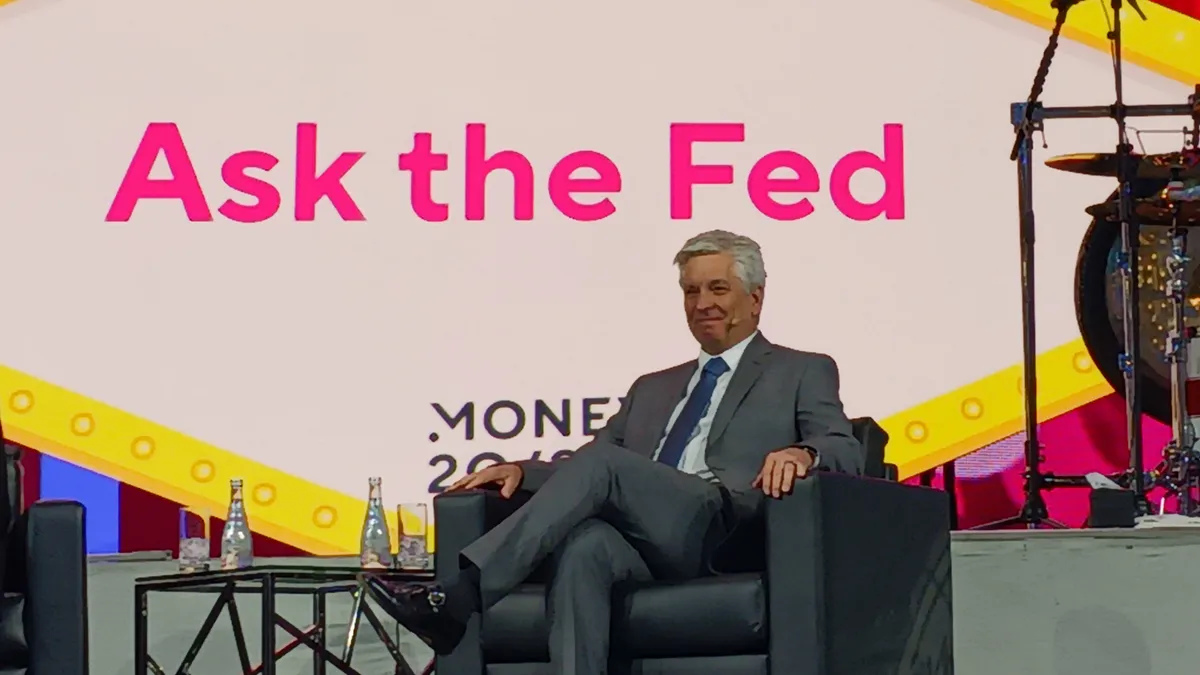Dive Brief:
- Federal Reserve Governor Christopher Waller opened a research workshop sponsored by the central bank in Washington by encouraging academics attending the event to keep studying the shortcomings and new technologies associated with the multi-billion dollar payments industry.
- As part of the event, co-hosted by the Federal Reserve Board, the Bank of Canada, and the Study Center Gerzensee, participants will present papers related to “friction in the financial markets,” Waller said Monday, according to the text of his remarks.
- Among the topics to be discussed during the five-day event, called the Summer Workshop on Money, Banking, Payments, and Finance, are the emergence of buy now, pay later tools; the evolution of instant payments systems; and the use of decentralized ledgers and cryptocurrencies. “Researching these new technologies helps us deepen our understanding of the implications for the broader financial system,” Waller said.
Dive Insight:
In opening the workshop, at which some 40 different topics will be discussed, Waller talked about the importance of understanding “key frictions” in exchange and payments and how ongoing innovations can inform monetary policy and financial market stability. The conference was scheduled to run from Aug. 19 through Aug 23.
“The evolving nature of money and banking creates new channels through which financial markets and institutions can affect the economy,” Waller said in his remarks. “The emergence of new technologies can generate complex economic interactions, and theoretical research and analytical work are crucial to understanding the implications.”
Some of the papers to be reviewed at the international event include: “From cash to buy-now-pay-later: impacts of platform-provided credit on market efficiency;” “Blockchain congestion facilitates currency competition;” “Payments, reserves and financial fragility;” and “The effect of instant payments on the banking system: liquidity transformation and risk-taking.”
The research is integral not only to government policy-making, but also to private sector advances. “Payments and the exchange process are multi-billion-dollar businesses and private sector firms are constantly innovating in this area to overcome the types of frictions that are well-known to this group,” Waller told the event’s attendees.
For its part, the Federal Reserve has also tried to make improvements to the traditional financial system over the past year. So far, the Federal Reserve has attracted some 900 banks and credit unions to its new instant payments system FedNow, surpassing the number of participants on the rival RTP network operated by The Clearing House. The Fed has said it may consider lowering FedNow fees in the future to lure more financial institutions to the year-old system.
In May, the Fed also proposed to increase the operating hours of its two big-value payments services, namely the Fedwire Funds Service and the National Settlement Service. As part of the proposal, the central bank said that the interbank settlement services would stretch the number of days of operation to include holidays and weekends by 2027, meaning they would operate every day of the year by that time.
In his leadership role at the Fed, Waller has taken a keen interest in such payments areas, benefiting from his own experience as a university professor and as the Gilbert F. Schaefer Chair of Economics at the University of Notre Dame.
“The knowledge that I have gained from interacting with researchers in this area for the last 20 years has aided me in one of my roles as a Federal Reserve governor, supporting the Fed's oversight of the U.S. payment system,” Waller said. “It also guides my thinking about how to make global payments cheaper and faster, which is a key objective adopted by the G20 countries in 2020 and is one fully supported by the Federal Reserve.”










